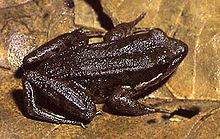Sylvirana is a genus of true frogs, family Ranidae, found in South and East Asia, from northeastern India in west to China in the north, Taiwan in the east, and Thailand in the south.[1][2] Originally proposed as a subgenus of Rana in 1992, it has been considered both a full genus and a synonym of Hylarana. Its current recognition at generic level stems from molecular genetic analyses published in 2015.[1][3]
| Sylvirana | |
|---|---|

| |
| Sylvirana nigrovittata | |
| Scientific classification | |
| Domain: | Eukaryota |
| Kingdom: | Animalia |
| Phylum: | Chordata |
| Class: | Amphibia |
| Order: | Anura |
| Family: | Ranidae |
| Genus: | Sylvirana Dubois, 1992 |
| Type species | |
| Lymnodytes nigrovittatus Blyth, 1855
| |
| Species | |
|
12 species (see text) | |
| Synonyms[1] | |
|
Boulengerana Fei, Ye, and Jiang, 2010 | |
Description
editSylvirana are generally medium-size frogs with robust bodies. They have similar postocular masks as in Papurana. The upper lip is gray, off-white, or occasionally, mottled. The dorsum is shagreened with spicules, or it can be warty. The dorsolateral folds a medium-sized and well-developed, either pale or the same color as the dorsum. The flanks have dark coloration below lateral ridges that fades to pale with well-defined dark spots. Males have paired vocal sac that may be internal or external.[3]
Species
editThere are 12 recognized species:[1][2]
- Sylvirana annamitica Sheridan and Stuart, 2018
- Sylvirana cubitalis (Smith, 1917)
- Sylvirana faber (Ohler, Swan, and Daltry, 2002)
- Sylvirana guentheri (Boulenger, 1882)
- Sylvirana lacrima Sheridan and Stuart, 2018
- Sylvirana malayana Sheridan and Stuart, 2018, PLoS One, 13(3: e0192766):
- Sylvirana maosonensis (Bourret, 1937)
- Sylvirana montosa Sheridan and Stuart, 2018
- Sylvirana mortenseni (Boulenger, 1903)
- Sylvirana nigrovittata (Blyth, 1856)
- Sylvirana roberti Sheridan and Stuart, 2018
- Sylvirana spinulosa (Smith, 1923)
References
edit- ^ a b c d Frost, Darrel R. (2020). "Sylvirana Dubois, 1992". Amphibian Species of the World: an Online Reference. Version 6.0. American Museum of Natural History. Archived from the original on 2023-06-07. Retrieved 16 January 2020.
- ^ a b "Ranidae". AmphibiaWeb. University of California, Berkeley. 2019. Retrieved 16 January 2020.
- ^ a b Oliver, Lauren A.; Prendini, Elizabeth; Kraus, Fred & Raxworthy, Christopher J. (2015). "Systematics and biogeography of the Hylarana frog (Anura: Ranidae) radiation across tropical Australasia, Southeast Asia, and Africa". Molecular Phylogenetics and Evolution. 90: 176–192. Bibcode:2015MolPE..90..176O. doi:10.1016/j.ympev.2015.05.001. PMID 25987527.